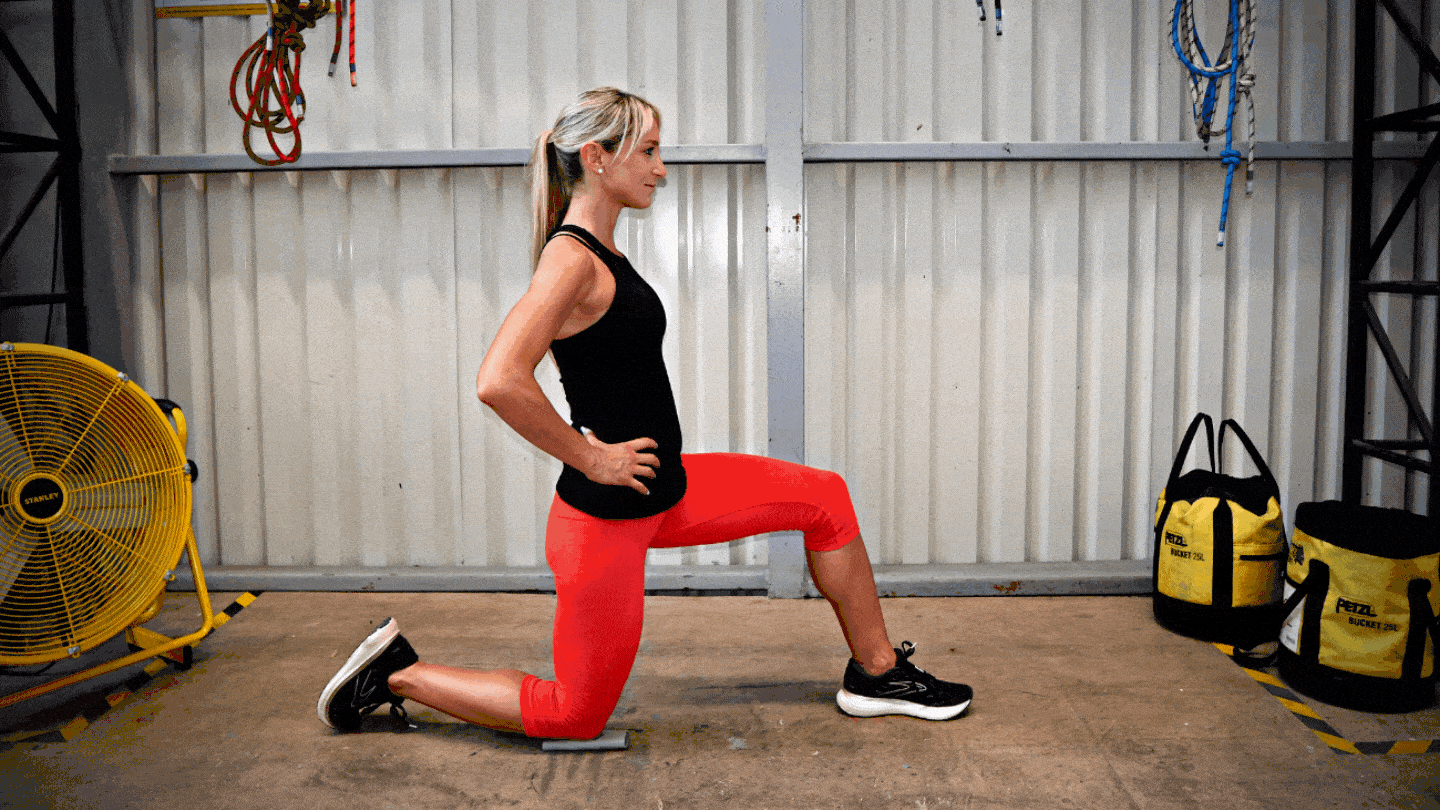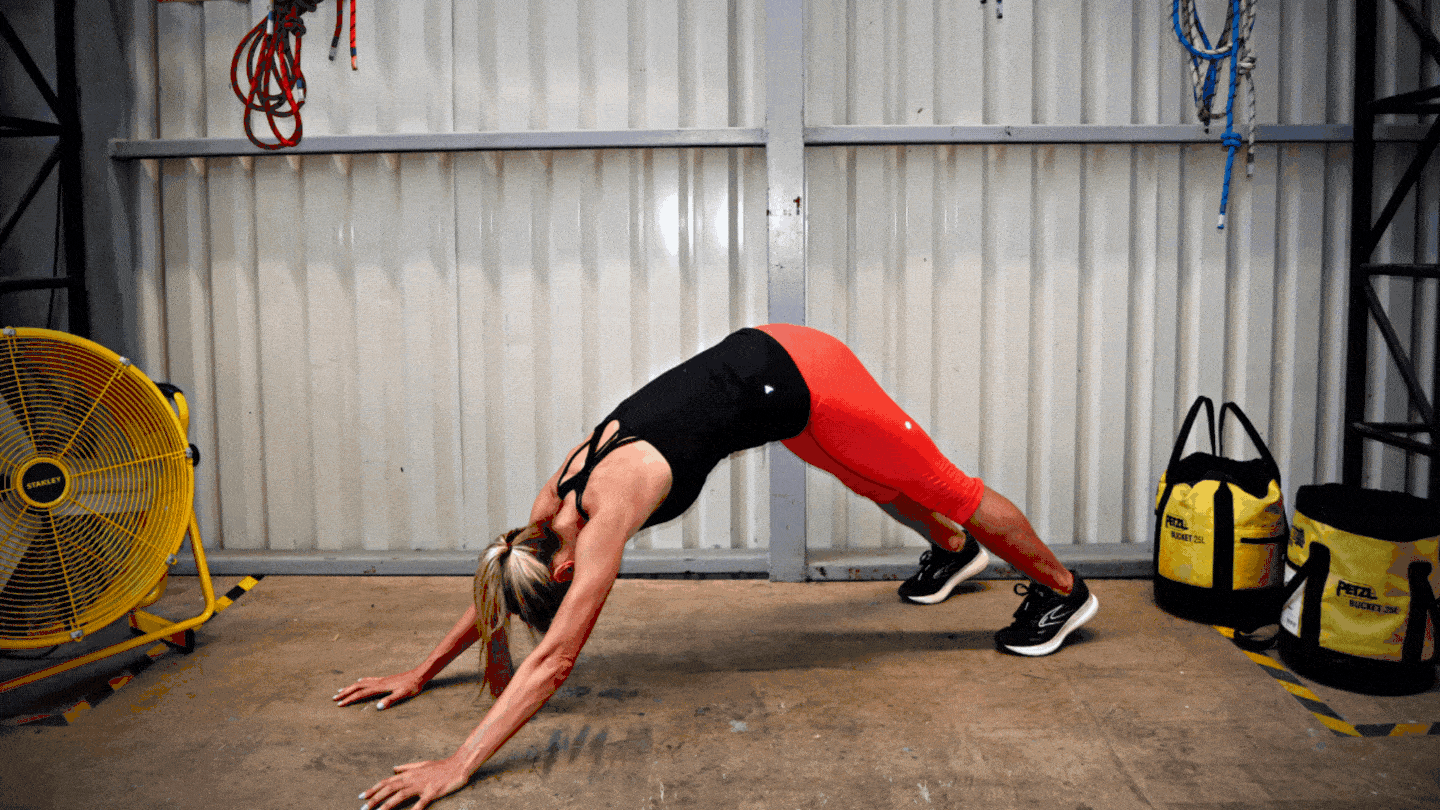Hip flexors are muscles located in the thighs and are responsible for the movement of the lower body. They help us kick, bend, jump, walk, and of course, run. They also help stabilize our spine and pelvis along with our core and other muscles.1ANDERSSON, E. A., NILSSON, J., & THORSTENSSON, A. (1997). Intramuscular EMG from the hip flexor muscles during human locomotion. Acta Physiologica Scandinavica, 161(3), 361–370. https://doi.org/10.1046/j.1365-201x.1997.00225.x
Our hip flexors can give us trouble from either using them too much or not using them enough, which is why our hip flexor stretches for runners are so important to include in your training program.
As most of us are seated at a desk for the majority of the day, this position can cause our hip flexors to tighten and shorten, causing imbalances, reduced range of motion, & reduced hip mobility. On the other hand, bumping up our running volume too much too soon can result in the overuse of the hip flexors. Even poor posture can potentially cause hip flexor injuries.
Our hip flexor muscles tend to be overlooked, but they have been shown to improve running performance if well taken care of. This guide will focus primarily on static hip flexor stretches for runners and give examples of hip flexor stretches to perform after each running workout and long run.

What Are The Hip Flexor Muscles?
As the name states quite clearly, your hip flexor muscles are located around the hip joint, and are used to flex your hips, bringing your knee upward toward your body. As you can see, this is a natural movement for walking and running.
The primary hip flexors are comprised of five muscles, including the sartorius, rectus femoris, pectineus, iliacus, and psoas.
The primary hip flexor muscles are the psoas, which originate in the lower spine vertebrae, and the iliacus, which originate in the pelvis. Both insert into the top of the femur. Collectively these two muscles are referred to as the iliopsoas and work together in hip flexion and stabilizing the trunk of your body.
The quadriceps and the glutes can also be considered secondary hip flexor muscle groups.
How Can I Protect My Hip Flexors From Injury?
Hip flexor injuries are quite common in runners. However, we can take a variety of preventative measures, including adding hip flexor stretches for runners to our routine, to try and avoid these injuries at all costs while at the same time working on improving our running performance.

Dynamic Hip Flexor Stretches For Runners
Before your workouts and runs, add in some dynamic stretching exercises that focus on your hip flexors to properly warm up. Running on cold muscles is never a good idea. You just need about 5 minutes to perform a full set of dynamic stretching before your run.
Here are some suggestions for dynamic hip flexor stretches for runners:
- High knees
- Butt kicks
- Skipping
- Hurdles (Front to back and back to front)
Strength Training For Hip Flexors
To strengthen your hip flexors, add some of the following exercises to your strength training program. To be an all-around strong runner, two sessions of strength training per week that don’t interfere with your running sessions are ideal.

Exercises For Runners To Strengthen The Hip Flexors
- Kettlebell swings
- Resistance band exercises: lateral leg lifts and clamshells
- Jumping lunges
- Single leg raises
- Bulgarian Split Squats
- Single leg bridges
- Bird dog
- Donkey Kicks
Remember, staying strong is a package deal. Not only do you need to strengthen your hip flexors, but all surrounding and complementary muscles such as your hamstrings, abductors, adductors, core, and glutes!
Running Form

Working on proper running form is also a great way to take care of your muscles. When running, ensure your body is aligned, keep your legs underneath you with each stride, keep your shoulders down and back, look straight ahead, relax your hands, and keep a short quick cadence.
For a more detailed account of your running form, check out our article: Proper Running Form: 8 Tips To Make It Look Effortless.
In addition to using good running form, warming up, and strengthening your hip flexors, stretching them out after your runs can also assist in your performance and, more importantly, lower your risk of injury.
Before we jump into the specific hip flexor stretches for runners, let’s look at the general rules for stretching your muscles out after a workout or run.

Tips For Static Stretching
- Hold each stretch between 45 – and 60 seconds to reap optimal benefits.
- Try to relax your muscles while holding the stretch.
- Breathe deeply while you stretch. With each exhale, you can try to gently stretch the muscle a tad more.
- Stretch your muscles gently. You should feel mild tension but not pain. If you feel pain, let up on the stretch or stop altogether.2Beaulieu, J. E. (1981). Developing a Stretching Program. The Physician and Sportsmedicine, 9(11), 59–69. https://doi.org/10.1080/00913847.1981.11711207
Now that we know how to stretch correctly, let’s look at the following 8 hip flexor stretches you can add to your post-run routine.
8 Hip Flexor Stretches For Runners
#1: Lunge Hip Flexor Stretch

- Start in a lunge position with your left leg in front of you at 90 degrees and your right knee on the ground directly underneath your body.
- Engage your core and keep your back straight. You can place your hands on your hips, your left knee out in front of you, or on the ground if you are flexible enough.
- Shift your body and your left knee forward, keeping your upper body straight.
- Hold the position for 45-60 seconds.
- Repeat on the other side.
#2: Butterfly Hip Flexor Stretch

- Sit in a crossed-legged with the soles of your feet lined up.
- Holding on to your ankles, let your knees fall toward the floor on either side of you. Most of us will not have this luck and need to use our elbows to gently push our knees toward the ground. Keep your back straight and core tight while doing so.
- Hinge at the hips, bend forwards, and reach out your arms in front of you to deepen the stretch.
- Hold the position for 45-60 seconds.
#3: Goblet Squat Hip Flexor Stretch

- Stand tall with your feet a bit more than hip-width apart.
- Shift your toes pointing outward at a 45-degree angle.
- Bend at the knees and lower your hips toward the floor until you reach a 90-degree angle squat position, keeping your core tight.
- Use your elbows to slightly press against the inside of your things and push your knees outward.
- Hold the position for 45-60 seconds.
#4: Standing Wide-Legged Hip Flexor Split Stretch

- Stand tall with your feet more than hip-width apart.
- Hinge at the hips and bend forward, reaching toward the ground underneath you.
- Place your hands as close to the ground as possible. You may use a block to place your hands on if you can’t reach the ground.
- For a deeper stretch and someone with great flexibility, you can place your elbows on the ground for a deeper stretch.
- Hold the position for 45-60 seconds.
#5: Reverse Pigeon Pose Stretch

- Lie on your back with your legs extended out in front of you.
- Bend your knees and keep your feet at hip width.
- With a flexed right foot, place your right ankle just above your left knee, crossing them.
- Pull your left leg towards your chest gently.
- To deepen the stretch, use your hands clasped around your left leg to pull it toward you even more.
- Hold the position for 45-60 seconds.
- Repeat on the other side.
#6: Pigeon Pose Stretch

- Enter the Downward Facing Dog pose (an upside-down V position) for your starting position.
- Bring your right knee forward, toward your right wrist, keeping your left leg straight behind you.
- Bend your right knee and gently lower your right glute to the ground
- Lower your torso over your right leg, stretching your arms out in front of you with your elbow slightly bent.
- Hold the position for 45-60 seconds.
- Repeat on the other side.
#7: Standing Lunge Hip Flexor Stretch

- Stand tall with your feet at hip-width apart.
- Step forward with your right foot.
- Keeping both feet flat on the ground, drive your right knee slightly forward while simultaneously arching your torso ever so gently back.
- Hold the position for 45-60 seconds.
- Repeat on the other side.
#8: Wide Split Seated Forward Bend Hip Flexor Stretch

- Sit tall and spread your legs into a split position. Everyone’s flexibility will vary significantly in this stretch, so find a position where you are comfortable and can still sit tall.
- Hinging at your hips, lean forward, stretch your arms out in front of you and reach.
- Hold the position for 45-60 seconds.
Final Thoughts
There you have it – eight of the best tight hip flexor stretches for runners out there to add to their post-workout routine.
Remember, your hip flexors aren’t the only group of muscles that need to be stretched out after a run. Also include your calves, quads, glutes, hamstrings, and any other muscles you may have used during your workout. Choose one or two stretches from each muscle group to ensure you include them all for a complete post-run stretching session.
If you are struggling with a hip flexor strain or sprain, knee pain, hip pain, or lower back pain, speak to a physical therapist.
To continue to add to your stretching library, you can take a look at our:
If you are looking for a new running goal and need a training plan, here are some of our training plan resources:














I am an ultra kayaker 67 years of age.
I transfer all your advice to my kayaking.
Thank you so much
Jim Kennedy.
Atlantic Sea Kayaking.
Hi Jim,
You are very welcome. I’m so glad this article was helpful!
Wow, an ultra kayaker sounds so awesome and adventurous!
Best,
Katelyn
Hello,
My name is Brian and I am a 47 year old pastor. One the hazards in ministry is sitting(@ my desk, my car, in people’s homes, hospitals, in meetings of all sorts). I felt my back, my hips, my whole lower body getting tighter and tighter, and stiffer and stiffer. I just saw your stretching work out on Google and did it, and I feel better even after the first time. I plan on doing these exercises everyday I pray, because THEY ARE A MUST TO VITALITY.
Hi Brian,
Yes, that is exactly what happens to those of us who are seated for most of the day. We tighten up and have to deal with stiff backs and often pain.
I am so happy that this article has helped you loosen up and feel better! Receiving this positive feedback inspires me to continue writing to help as many people as I can.
Thanks again for taking the time to write!
Best,
Katelyn